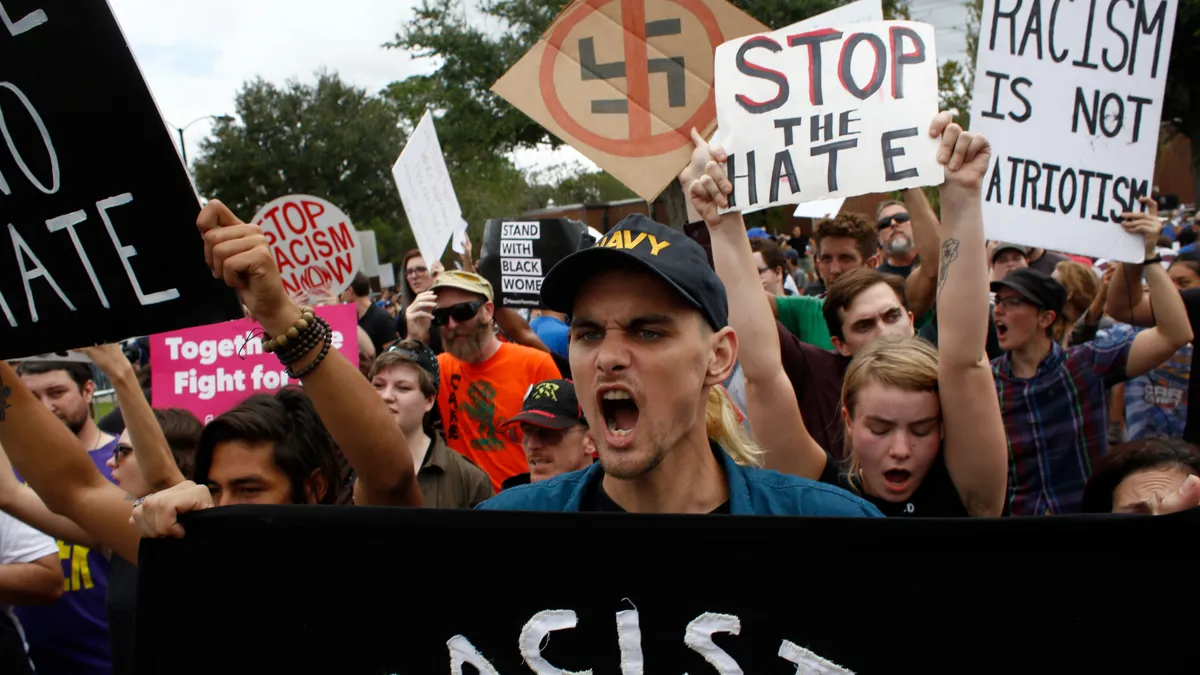Dive Brief:
- College faculty, administrators and governing boards should all help strengthen free expression on campuses, according to a new series of recommendations from the Bipartisan Policy Center.
- The Washington, D.C.-based think tank developed a "roadmap," released Tuesday, for colleges to adapt. It focuses heavily on proactive approaches to addressing "inevitable" conflicts over free speech that arise on campuses.
- Some students have started following poor practices when it comes to free expression, self-censoring or shouting down those with whom they disagree, the report emphasizes.
Dive Insight:
The center's report references declining public trust in higher education that it links to erosion of campus free expression.
Colleges historically serve as hubs for exchanges of ideas. But recent trends — speaker shout-downs and a conservative view that institutions only value liberal ideology — have cast doubt on institutions' effectiveness in this role. This perception has consequences, for instance alumni withholding donations until colleges address campus free speech concerns.
The analysis cites developments that its authors feel corroded the culture of free inquiry, including stark partisanship nationwide, the young Generation Z's ill-preparedness for having difficult conversations, and a rise in social media.
Higher ed officials at all levels could help combat these problems, according to the report.
Presidents and their leadership teams can map out responses to free speech scandals with case studies that identify "the various reputational, fiscal, and community pressures that may be faced." High-ranking officials should also preemptively speak about free expression, potentially by hosting events with campus clubs that have divergent viewpoints, the report said.
In addition, officials should plan the issues on which they will take institutional positions, as certain matters might not directly affect a campus, but could nonetheless reverberate on it. Campus leaders at public institutions, for instance, have at times denounced white supremacists while explaining their legal obligation to allow them to speak on campus. This occurred at the University of Florida in 2017 when alt-right figure Richard Spencer spoke there but was publicly criticized by the administration.
It's key for college presidents to take strong stances on free expression, said Chris Gregoire, former governor of Washington and now chief executive of a business coalition, who co-chaired the task force that wrote the report. Jim Douglas, former governor of Vermont and currently a scholar at Middlebury College, also chaired the group. They both spoke at a virtual event introducing it Tuesday.
Gregoire said this issue came on her radar in 2017 when protests emerged over a planned speech by Milo Yiannopoulos, a conservative provocateur and former Breitbart editor, at the University of Washington. An individual was shot and wounded, and the event cost more than $75,000 in overtime for law enforcement.
When she was governor and appointing members to higher ed governing bodies, Gregoire said, she made clear their job was to support presidents during such crises. The report states governing panels can help by passing public resolutions supporting free speech policies and defending leadership in difficult times.
At the classroom level, faculty can build free expression and viewpoint diversity into curricula, according to the report. Colleges could also weave campus free inquiry into orientations for both faculty and first-year students.
Students should be encouraged to engage in public expression and be taught to respect campus groups, even those with ideas they find distasteful, the report states.
Lori White, president of DePauw University in Indiana, said during the event students aren't persuaded by hard data when it comes to viewpoints they reject. They react emotionally, and so administrators should provide them with proper tools for expressing themselves, White said.
Students particularly value diversity and inclusion, and balancing that with free speech considerations can be challenging, as the report identifies.
White said presidents need to use their pulpit to respond to concerns that free expression would override a respectful learning environment.
In one episode on the DePauw campus, an instructor used a racial slur in an academic context. Students called on White to ban the term. White, in a message to students, called the word despicable, but did not forbid it and said its use in a classroom setting raised questions about whether controversial language can be taught or used in a non-offensive way.
"There are no simple answers or strategies addressing the perceived tension that pits academic freedom and freedom of expression against diversity, equity, and inclusion," the report states. "Campuses will need to take some risks, to learn from trial and error, and engage the community actively."











